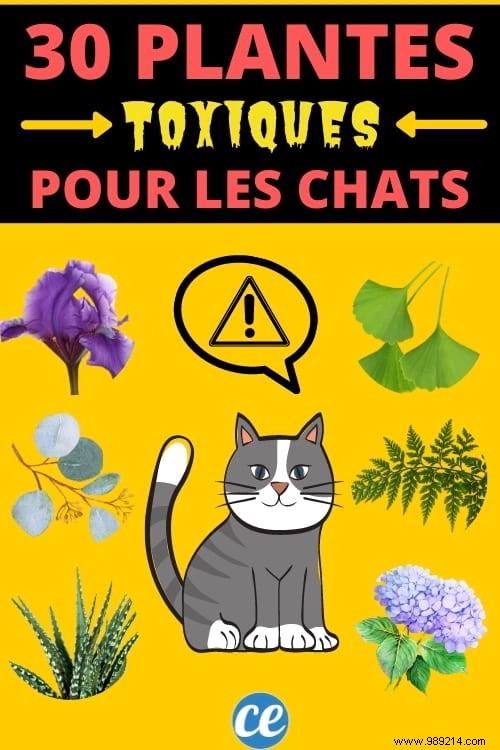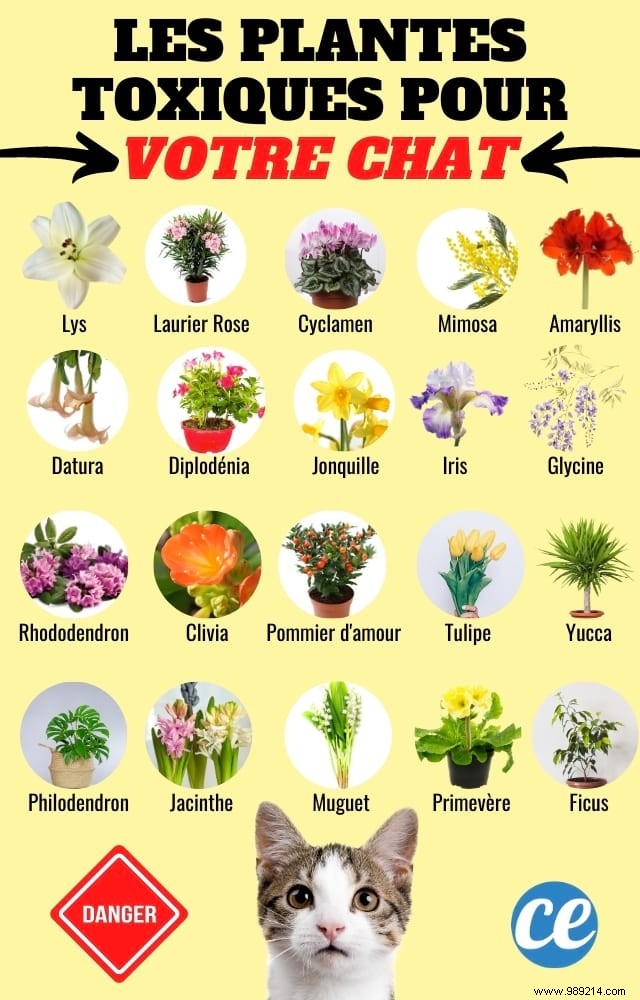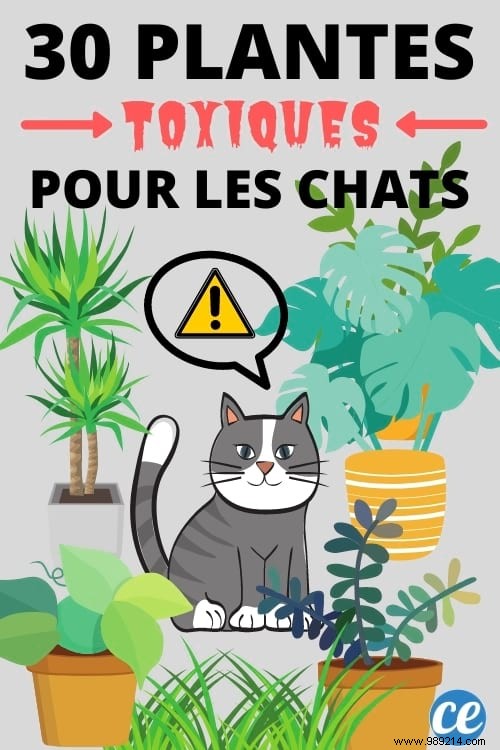
Some plants don't get along well with our 4-legged friends.
And cats and kittens are particularly sensitive...
It must be said that they tend to eat anything green!
It is therefore important to recognize toxic plants (and foods too) for cats and keep them out of their way.
Here is a list of 30 poisonous plants for cats . Watch:

Infographic source: Equilicat by Hugues Martinat - Cat behavior specialist in Paris in the 15th arrondissement. Do not hesitate to contact him at 07.63.06.05.99 if you have a problem with chat and would like a consultation.
In case of poisoning, the cat may vomit, salivate excessively or worse have diarrhea.
In the most serious cases, all this can be accompanied by nervous disorders (tremors, convulsions) and cardiac disorders (slowing or racing heartbeat).
Above all, do not try anything alone, but consult the veterinarian immediately.
1. Aloe vera: aloe vera is a plant well known for its virtues, but it can cause diarrhea and hemorrhagic diarrhea in cats.
2. Amaryllis: it is this plant with a big flower that we grow at Christmas, but it causes neurological disorders in the cat if he eats it.
3. Arum: if your cat eats this large plant with white flowers, it can have digestive disorders, edema and it can go as far as coma.
4. Caladium (or angel's wing):the caladium has large red leaves that irritate the mucous membranes and skin of the cat.
5. Chlorophytum: with its long white striped leaves, this plant is harmful to the kidneys of the cat.
6. Dieffenbachia and croton: a plant with colorful leaves that causes digestive problems, kidney damage or blindness in cats who ingest a lot.
7. The ficus: the leaves of the ficus cause digestive problems and vomiting.
8. Philodendron: the large leaves of the philodendron lead to digestive and kidney disorders in cats.
9. The dracaena: this species of small palm tree with colorful leaves makes the cat vomit and can cause digestive problems.
10. Yucca: by eating the yucca, the cat will salivate to the extreme and this can lead to paralysis.
My advice: there is a very simple rule to remember:white or red sheet =poison for animals.

11. Azalea: this pretty flowering plant causes intense salivation and a state of weakness.
12. Boxwood: eating boxwood in cats causes digestive and neurological disorders.
13. Celandine: with its small yellow flowers, celandine causes neurological disorders in cats.
14. Hemlock: it is the poison plant par excellence that causes respiratory problems and extreme fatigue.
15. Colchic: it is also called "dog killer", that says a lot. It causes vomiting, abdominal pain, diarrhea and worse muscle weakness or convulsions.
16. The datura: this plant with large white bells causes digestive and neurological disorders.
17. Foxglove: this decorative flower causes heart problems in small animals.
18. Eucalyptus: eucalyptus leaves cause digestive problems in cats and stomach aches.
19. Fern: this plant is toxic to many animals. For the cat, it causes diarrhea that can go as far as hemorrhage.
20. Ginkgo biloba: yet very decorative, ginkgo fruits are allergenic.
21. Hellebore: it is also called "Christmas rose". It is especially the root that is toxic and causes paralysis of the heart muscle or digestive disorders.
22. Hydrangea: the hydrangea slowly suffocates animals that ingest it.
23. The yew: the seed is the most toxic part and leads to digestive disorders.
24. The iris :it must be ingested in high doses for it to cause digestive and neurological disorders.
25. Daffodil: it is the bulb that is toxic and causes digestive disorders.
26. The laurel: the oleander is toxic and causes heart problems.
27. The lily: the whole plant is toxic to cats and causes serious kidney problems.
28. Lily of the valley: it causes digestive and cardiac disorders.
29. Cedar: even if the cat does not naturally go to thuja, it reaches the liver and kidneys.
30. Euphorbia: consumed in high doses, this plant burns the mouth and throat, causes stomach aches and vomiting.
My advice: your cat nibbles all the plants? Give him a jar of catnip, maybe he needs to purge!
